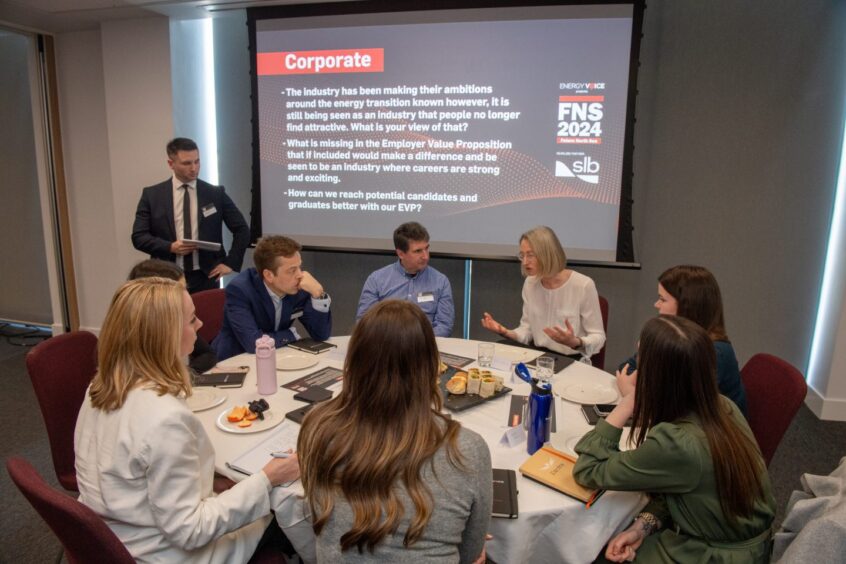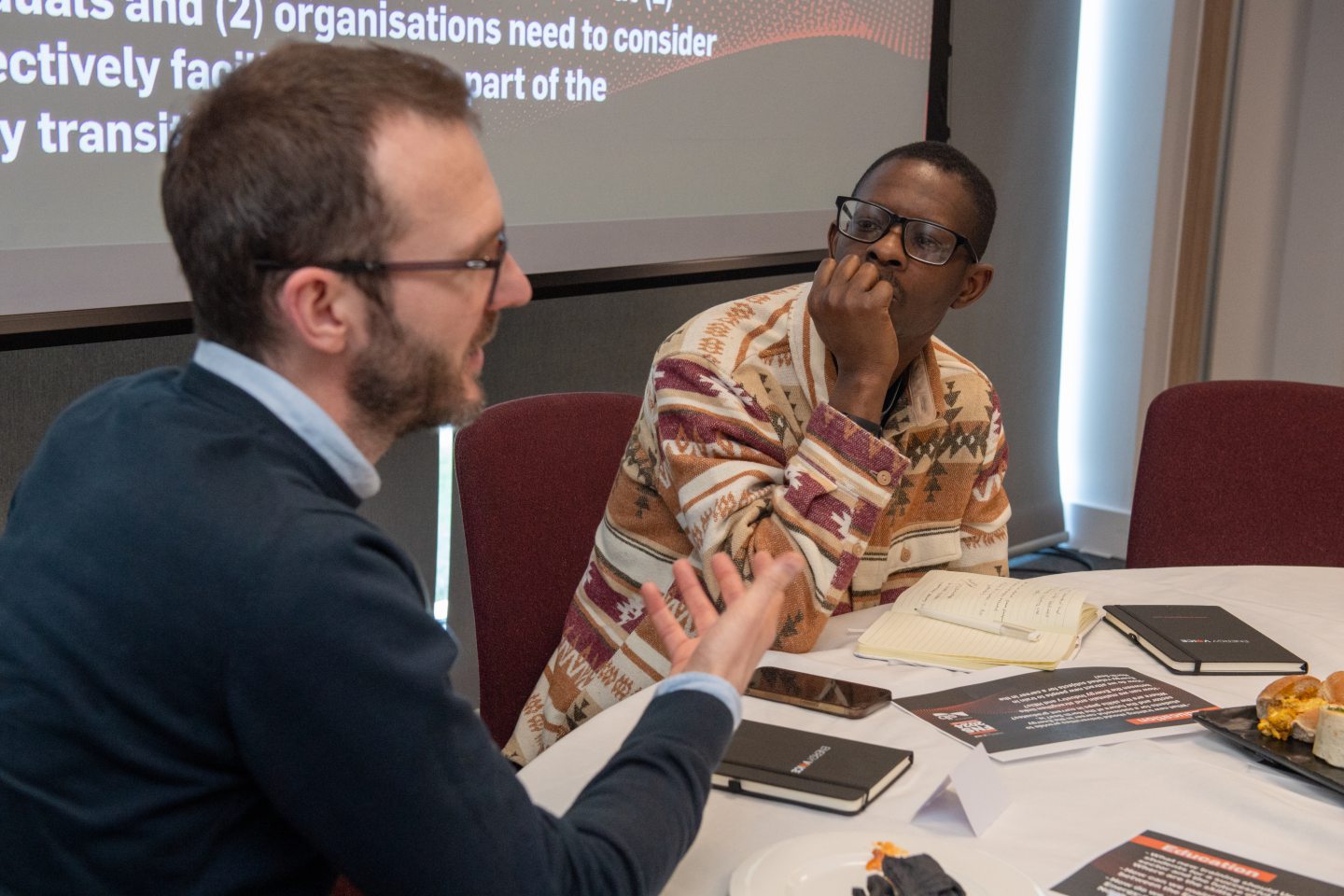
Industry leaders from across the North Sea oil and gas sector met in Aberdeen today to discuss the challenge of attracting, training and retaining skilled young people.
During a workshop event at Future North Sea, hosted by Energy Voice at the P&J Live, participants brainstormed ways to tackle the talent conundrum facing North Sea firms.
The event comes amid warnings of a net zero skills “collapse” in the UK after a more than 40% drop in the number of geoscience undergraduates.
Meanwhile, a recent survey of early-career workers suggests nearly half the general population would not consider a job in oil and gas.
Bringing together leaders representing oil and gas firms, skills and training bodies, and the tertiary education sector, the workshop focused on ways to address the growing challenge of finding skilled workers needed to support the energy transition.
Skills, education, corporate
High on the agenda was the challenge facing oil and gas firms when it comes to engaging with university students, as well as universities themselves.
University of Aberdeen geosciences lecturer Dr Joseph Armstrong said the drop in geoscience undergraduate students is happening across the UK.
He said even if undergraduate students returned to the higher level seen in 2017, it would take five years or more for graduate and postgraduate numbers to recover.
Meanwhile, several participants said many in the higher education sector are unwilling to engage with oil and gas firms, even if the focus is on renewables.
Some UK universities are even banning oil and gas firms from taking part in recruitment events on campus.
In addition, oil and gas firms are increasingly attracting media attention for contributing funding to universities through scholarships and research grants.
Education challenge
But participants in the Future North Sea workforce said banning energy firms from engaging with university students prevents them from pursuing careers focused on renewable and low-carbon energy, particularly in carbon capture and hydrogen.
Attendees also discussed the challenge of engaging with younger students in the years before they reach university, with teachers and parents often themselves unaware of the variety of career options within the energy sector.
A recent report compiled by the National Energy Skills Accelerator (NESA) found a need to better communicate what a role in ‘engineering’ or ‘welding’ means in relation to energy.
It also found a need for “educating the educator” to attract new entrants.
“This applies to children and young adults, as much as to new graduates and adults with work experience,” the report states.
“To support Aberdeen in becoming a global energy hub, there must be clear and coherent messaging on the investment and opportunity in the North East surrounding renewables to demonstrate that choosing a career in energy offers a sustainable future and job security is required.
“This includes acknowledging and demonstrating the work required to decarbonise and decommission oil and gas activities, and the longevity of career opportunities throughout the sector as a whole.”
Energy transition skills
Participants also discussed the importance of recognising the existing skills within the North Sea oil and gas workforce which can be transferred to renewable energy projects.
The industry is working to create a standardised skills passport allowing oil and gas workers to have their skills recognised, but the project has been delayed.
Participants said while progress on the skills passport is welcome, more needs to be done to ensure that oil and gas workers are not discouraged from transferring to the offshore wind sector by fears they will drop down the workplace seniority ladder.
There needs to be a greater focus on what the skills of a worker mean, rather than what their job title is, participants said.
Additionally, participants said more work needs to be done to foster better leadership and management skills within firms to increase retention and facilitate career progression.
OPITO head of skills policy Michael Love said there often isn’t enough visibility on career pathways within the energy sector for young people.
“I don’t know if that’s necessarily an oil and gas exclusive issue,” he said.
“I think that’s probably symptomatic of the skills landscape across the UK.
“It’s devolved, it’s complex, there are different levels of qualification just for the sake of the levels being different it feels like sometimes.”
Mr Love said companies need to more clearly communicate careers pathways within their own organisation as well.
Corporate messaging
The final topic of discussion focused on the role corporations need to play in fostering a skilled energy workforce.
Diversity, equity and inclusion remains a challenge for oil and gas firms, and the UK wind sector is also finding it difficult to attract women into offshore roles.
Skills Development Scotland growth and inward investment manager Heather Milne said while the representation of women in senior leadership roles had improved during her career, the issue was “still endemic within the industry”.
Workshop participants also discussed the messaging problem corporations face, with attempts to highlight their work in renewables often criticised as “greenwashing“.
They said many in the general public don’t realise the areas of modern life that oil and gas facilitates outside of its energy use.
SLB head of human resources Dawn Brady said people working in the oil and gas and energy sectors need to be “proud” of the work they’re doing and its impact on the energy transition.
Participants also said companies need to do a better job of highlighting the career paths available to young people outside their corporate offices as well, focusing more on apprentices and interns.
However, participants also said corporates may need to show some humility and recognise the way they’re viewed by some in the wider community, and focus more on demonstrating genuine commitment to combating climate change.
Recommended for you


 © Supplied by Kenny Elrick/DC Thom
© Supplied by Kenny Elrick/DC Thom © Kenny Elrick/DC Thomson
© Kenny Elrick/DC Thomson © Kenny Elrick/DC Thomson
© Kenny Elrick/DC Thomson